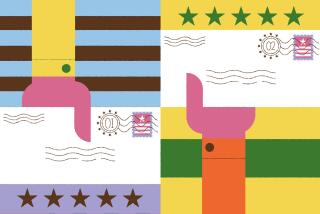22 Years in Cuban Prison : U.S. Rights Envoy Is an Expert on Pain
- Share via
GENEVA — Pain and punishment are more than mere agenda items to Armando Valladares, a human rights ambassador with a resume forged by two decades of imprisonment.
Valladares is the chief U.S. delegate to the U.N. Human Rights Commission. He is among the delegates from 43 nations who are meeting here to discuss human rights violations.
But as a political prisoner in Cuba for 22 years, he is far from a typical ambassador.
When he talks about torture, he points to broken bones that never healed quite right. When he talks about prison life, he displays scars left on his hands by hungry rats.
Poems in Blood
When he discusses desperation, he can recall being denied pens and pencils in prison, and writing a poem in his own blood.
When the topic is cruelty, he talks about forgiveness.
“I do not hate anyone,” he said, “not even those who tortured me, because I think that hatred kills the person who feels it. I would say ultimately that those years were a struggle between love and hatred, and love always triumphs.”
Valladares, 50, a U.S. citizen for slightly more than a year, is his country’s latest weapon in a struggle to get the commission to discuss alleged human rights violations in Cuba.
Fighting ‘Selective Sensitivity’
In an interview, Valladares said the effort is a struggle “against a selective sensitivity” in the commission, which routinely condemns human rights violations in Israeli-occupied territories, South Africa and Chile.
But his appointment as chief U.S. delegate has angered the Cuban government, which denounces Valladares as an impostor who never was tortured or paralyzed during his prison tenure.
Valladares is a slightly built man with intense eyes under a shock of dark hair just beginning to turn gray. He is the father of two boys--one 3 and the other nearly 2--and the husband of a woman he met in prison when she came to visit her father. They were married behind bars.
He was just 23 when he was sentenced to a 30-year term for what he says were anti-communist remarks. In a book about his experiences, “Against All Hope,” he said prisoners were systematically tortured and denied proper medical care.
5 Years in Wheelchair
He said at one point, after a 46-day hunger strike in 1974, he developed polyneuropathy, a nervous system deterioration that confined him to a wheelchair for five years.
At that time he began writing poetry and smuggling it out of prison to his wife, Martha, then living in the United States, he said.
He won his freedom in October, 1982, after French President Francois Mitterrand intervened in his case. Just a month after obtaining U.S. citizenship, he was added to the U.S. human rights delegation.
The chief Cuban delegate, Raul Roa Kouri, told a news conference that Valladares’ book was “full of lies.”
Cuban Rebuttal
The Cuban government held similar news conferences in Washington and Mexico City and distributed pamphlets rejecting what it said were lies by the State Department about Valladares’ past.
“It is an attack against me, a man, because they cannot refute the violations of human rights that are happening in their country,” Valladares said.
Although his mother and sister live in Miami, his 77-year-old father remains in Cuba.
“He lives in the center of the island, and often the authorities tell him to pack all his things because he is leaving Cuba,” Valladares said. “Then he travels all the way to Havana and they tell him it was an error.”
Denied Eye Treatment
He said his father also is denied treatment for an eye ailment that has left him nearly blind.
“I think that the Cuban government is moving this way against him thinking perhaps that I will change my attitude,” Valladares said. “I will not do that.”
But he does bring a dramatic air of realism to the commission.
Speaking recently on torture, Valladares said: “I remember when they had me in a punishment cell, naked, my leg fractured in several places--fractures that were never treated and eventually fused into a mass of deformed bones.
“Through the wire mesh that covered the cell, the guards would pour over me buckets of urine and excrement that they had collected earlier.”
International condemnation of such acts, he said “is the only thing capable of pressuring the torturers.”
More to Read
Sign up for Essential California
The most important California stories and recommendations in your inbox every morning.
You may occasionally receive promotional content from the Los Angeles Times.













